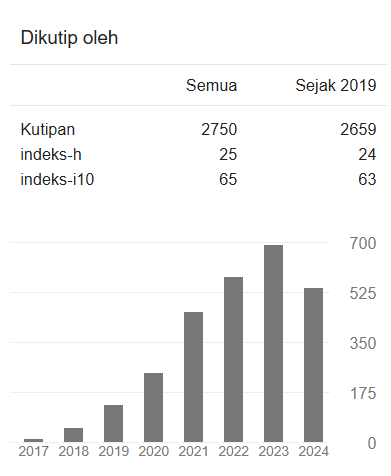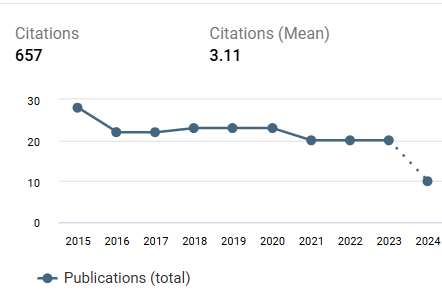Development of innovative e-module on team-based method to improve collaboration skills
DOI:
https://doi.org/10.22219/jinop.v9i2.23269Keywords:
Innovative e-module, team-based method, Perekonomian IndonesiaAbstract
Nowadays, the demand for collaborative skills is a fundamental element in learning. However, many teaching materials and modules do not yet accommodate these skills. This research aims to develop an innovative e-module based on the team-based method to enhance students' learning outcomes and collaborative skills in the course of Indonesian Economics. This research follows the Research and Development (R&D) approach using the ADDIE model, with data collection instruments including a needs analysis questionnaire, an expert evaluation scale for the e-module's content and media, a self-directed learning scale, and a student response scale, which were subsequently analyzed descriptively. The research results indicate that, based on assessments from content experts, media experts, and practitioners, the e-module is considered highly suitable. The effectiveness testing results demonstrate that the innovative e-module based on the team-based method significantly enhances students' learning outcomes and collaborative skills. As an implication, instructors of the Indonesian Economics course are encouraged to implement this e-module while considering the characteristics of the students they are teaching.
Downloads
References
Asmuni, A. (2020). Problematika Pembelajaran Daring di Masa Pandemi Covid-19 dan Solusi Pemecahannya. Jurnal Paedagogy, 7(4), 281. https://doi.org/10.33394/jp.v7i4.2941
Burgess, A., Haq, I., Bleasel, J., Roberts, C., Garsia, R., Randal, N., & Mellis, C. (2019). Team-based learning (TBL): A community of practice. BMC Medical Education, 19(1). https://doi.org/10.1186/s12909-019-1795-4
Burgess, A., & Matar, E. (2020). Team-based learning (TBL): Theory, planning, practice, and implementation. Clinical Education for the Health Professions, 1-29. https://doi.org/10.1007/978-981-13-6106-7_128-1
Child, S., & Shaw, S. (2015). Collaboration in the 21st century: Implications for assessment”. Economics, 21, 2008,
Fogarassy, C., & Finger, D. (2020). Theoretical and practical approaches of circular economy for business models and technological solutions. Resources, 9(6), 76. https://doi.org/10.3390/resources9060076
Griffin, B. McGaw, & E. Care (Eds.).2012. “Assesment and teaching of 21 st century skills” (p. 17-65). Dordrech: Springer
Greennstein, L. 2013. “Assesing 21st century skills: a guide to evaluating mastery and authentic learning”.
Handajani, S., Pratiwi, H., & Mardiyana. (2018). The 21 century skills with model eliciting activities on linear program. Journal of Physics: Conference Series, 1008, 012059. https://doi.org/10.1088/1742-6596/1008/1/012059
Harits, M., Sujadi, I., & Slamet, I. (2019). Technological, pedagogical, and content knowledge math teachers: To develop 21 century skills students. Journal of Physics: Conference Series, 1321(3), 032011.https://doi.org/10.1088/1742-6596/1321/3/032011
Hidayat, D. R., Rohaya, A., Nadine, F., & Ramadhan, H. (2020). Kemandirian belajar peserta didik dalam pembelajaran daring pada masa pandemi covid -19. Perspektif Ilmu Pendidikan, 34(2), 147-154. https://doi.org/10.21009/pip.342.9
Hargreaves, A., & O'Connor, M. T. 2018. “Collaborative professionalism: When teaching together means learning for all”. Corwin Press.
Jena, P. K. (2020). Impact of pandemic COVID-19 on education in India. International Journal of Current Research, 12(07), 12582–12586. https://doi.org/10.24941/ijcr.39209.07.2020
Jones, P., & Hammond, J. (2016). Talking to learn: Dialogic teaching in conversation with educational linguistics. Research Papers in Education, 31(1), 1-4. https://doi.org/10.1080/02671522.2016.1106691
Kullberg, A. (2012). Can findings from learning studies be shared by others? International Journal for Lesson and Learning Studies, 1(3), 232-244. https://doi.org/10.1108/20468251211256438
Laal, M., & Laal, M. 2012. “Collaborative learning: what is it?”. Procedia-Social and Behavioral Sciences, 31, 491-495,. https://doi.org/10.1016/j.sbspro.2011.12.092
Lee, S. W., & Tsai, C. (2011). Students’ perceptions of collaboration, self-regulated learning, and information seeking in the context of internet-based learning and traditional learning. Computers in Human Behavior, 27(2), 905-914. https://doi.org/10.1016/j.chb.2010.11.016
Lestaringsih, E. D., & Wijayatiningsih, T. D. “Pengembangan Model Problem Based Learning dan Blended Learning Dalam Pembelajaran Pemantapan Kemampuan Profesional Mahasiswa”. LITE: Jurnal Bahasa, Sastra, dan Budaya, 13(2), 105-121, 2017. https://doi.org/10.33633/lite.v13i2.1714
Marlina, W., & Jayanti, D. (2019). 4C dalam pembelajaran matematika untuk menghadapi era revolusi industri 4.0. Prosiding Sendika, 5(1), 392–396
Meng, L., Hua, F., & Bian, Z. (2020). Coronavirus Disease 2019 (COVID-19): Emerging and Future Challenges for Dental and Oral Medicine. Journal of Dental Research, 99(5), 481–487. https://doi.org/10.1177/0022034520914246
Raniah, D., Efendi, R., Liliawati, W., Studi, P., Fisika, P., Pendidikan, F.,& Pengetahuan, I. (2018). Profil keterampilan abad 21 pada pembelajaran project based learning ( pjbl ) materi gelombang bunyi. Prosiding Seminar Nasional Fisika (SINAFI), 19–24
Rasyid, M. Al, & Khoirunnisa, F. (2021). The Effect of project-based learning on collaboration skills of high school students. Jurnal Pendidikan Sains (Jps), 9(1), 113. https://doi.org/10.26714/jps.9.1.2021.113-119
Ridwan, S. (2019). Intellectual capital dan knowledge management dalam inovasi dan kreasi media pembelajaran berbasis kemampuan 4c dan literasi. Proceedings of the ICECRS, 2(1), 75. https://doi.org/10.21070/picecrs.v2i1.2414
Rigianti, H. A. (2020). KENDALA PEMBELAJARAN DARING GURU SEKOLAH DASAR DI KABUPATEN BANJARNEGARA. Elementary School: Jurnal Pendidikan Dan Pembelajaran Ke-SD-An, 7(2), 297–302. https://doi.org/10.31316/esjurnal.v7i2.768
Sadikin, A., & Hamidah, A. (2020). Pembelajaran Daring di Tengah Wabah Covid-19. Biodik, 6(2), 109–119. https://doi.org/10.22437/bio.v6i2.9759
Saenab, S., Yunus, S. R., & Virninda, A. N. (2017). PjBL untuk pengembangan keterampilan mahasiswa: sebuah kajian deskriptif tentang peran pjbl dalam melejitkan keterampilan komunikasi dan kolaborasi mahasiswa. Seminar Nasional Lembaga Penelitian UNM, 2(1), 45–50
Scherer, R., Siddiq, F., & Tondeur, J. (2020). All the same or different? Revisiting measures of teachers’ technology acceptance. Computers and Education, 143(0318), 103656. https://doi.org/10.1016/j.compedu.2019.103656
Suardipa, I. P. (2020). Sociocultural-Revolution Ala Vygotsky Dalam Konteks Pembelajaran. Jurnal Widya Kumara Jurnal Pendidikan Anak Usia Dini, 1(2), 48–58.
Sumardeni, W., Astawa, I. B., & Maryati, T. (2023). Pengaruh task-based learning model terhadap Keterampilan Komunikasi Dan Kolaborasi Siswa dalam Pembelajaran IPS. Media Komunikasi FPIPS, 22(1), 80-92. https://doi.org/10.23887/mkfis.v22i1.51045
Toquero, C. M. (2020). Challenges and Opportunities for Higher Education amid the COVID-19 Pandemic:The Philippine Context. Pedagogical Research, 5(4), em0063. https://doi.org/10.29333/pr/7947
Widodo, A., & Nursaptini. (2020). Problematika Pembelajaran daring dalam Perspekif Mahasiswa. Elementary School Education Journal, 4(2), 100–115. https://doi.org/10.30651/else.v4i2.5340
William., T & Flora Hewlett. 2014. “Foundation. Deeper Learning for every student every day”.
Wodon, Q. (2020). COVID-19 Crisis, Impacts on Catholic Schools, and Potential Responses | Part 1: Developed Countries with Focus on the United States. Journal of Catholic Education, 23 (1). http://dx.doi.org/10.15365/joce.2301022020
Zhou, L., Wu, S., Zhou, M., & Li, F. (2020). 'School’s out, but class’ on', the largest online education in the world today: Taking China’s practical exploration during the COVID-19 epidemic prevention and control as an example. SSRN Electronic Journal. https://doi.org/10.2139/ssrn.3555520
Downloads
Published
How to Cite
Issue
Section
License
Copyright (c) 2023 Kusumantoro et al

This work is licensed under a Creative Commons Attribution 4.0 International License.
Copyright Notice
Authors who publish with JINoP (Jurnal Inoasi Pembelajaran) agree to the following terms:
- For all articles published in the JINoP (Jurnal Inovasi Pembelajaran), copyright is retained by the authors. Authors give permission to the publisher to announce the work with conditions. When the manuscript is accepted for publication, the authors agree to the automatic transfer of the publishing right to the publisher.
- Authors retain copyright and grant the journal the right of first publication with the work simultaneously licensed under a Creative Commons Attribution 4.0 International License. that allows others to share the work with an acknowledgment of the work's authorship and initial publication in this journal.
- Authors are able to enter into separate, additional contractual arrangements for the non-exclusive distribution of the journal's published version of the work (e.g., post it to an institutional repository or publish it in a book), with an acknowledgment of its initial publication in this journal.
- Authors are permitted and encouraged to post their work online (e.g., in institutional repositories or on their website) prior to and during the submission process, as it can lead to productive exchanges, as well as earlier and greater citation of published work (See The Effect of Open Access).








